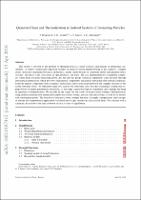Please use this identifier to cite or link to this item:
https://hdl.handle.net/20.500.12202/4284Full metadata record
| DC Field | Value | Language |
|---|---|---|
| dc.contributor.author | Santos, Lea F. | - |
| dc.contributor.author | Izrailev, F.M. | - |
| dc.contributor.author | Borgonovi, F. | - |
| dc.contributor.author | Zelevinsky, V.G. | - |
| dc.date.accessioned | 2018-12-26T20:53:20Z | - |
| dc.date.available | 2018-12-26T20:53:20Z | - |
| dc.date.issued | 2016 | - |
| dc.identifier.citation | Borgonovi, F., Izrailev, F.M., Santos, L.F., and Zelevinsky, V.G. (2016). Quantum Chaos and Thermalization in Isolated Systems of Interacting Particles. Physical Reports 626, 1-58. | en_US |
| dc.identifier.issn | 0370-1573 | - |
| dc.identifier.uri | http://dx.doi.org/10.1016/j.physrep.2016.02.005 | en_US |
| dc.identifier.uri | https://hdl.handle.net/20.500.12202/4284 | - |
| dc.description.abstract | This review is devoted to the problem of thermalization in a small isolated conglomerate of interacting constituents. A variety of physically important systems of intensive current interest belong to this category: complex atoms, molecules (including biological molecules), nuclei, small devices of condensed matter and quantum optics on nano- and micro-scale, cold atoms in optical lattices, ion traps. Physical implementations of quantum computers, where there are many interacting qubits, also fall into this group. Statistical regularities come into play through inter-particle interactions, which have two fundamental components: mean field, that along with external conditions, forms the regular component of the dynamics, and residual interactions responsible for the complex structure of the actual stationary states. At sufficiently high level density, the stationary states become exceedingly complicated superpositions of simple quasiparticle excitations. At this stage, regularities typical of quantum chaos emerge and bring in signatures of thermalization. We describe all the stages and the results of the processes leading to thermalization, using analytical and massive numerical examples for realistic atomic, nuclear, and spin systems, as well as for models with random parameters. The structure of stationary states, strength functions of simple configurations, and concepts of entropy and temperature in application to isolated mesoscopic systems are discussed in detail. We conclude with a schematic discussion of the time evolution of such systems to equilibrium. | en_US |
| dc.language.iso | en_US | en_US |
| dc.publisher | American Physical Society | en_US |
| dc.relation.ispartofseries | Physical Reports; | - |
| dc.rights | Attribution-NonCommercial-NoDerivs 3.0 United States | * |
| dc.rights.uri | http://creativecommons.org/licenses/by-nc-nd/3.0/us/ | * |
| dc.subject | statistical mechanics | en_US |
| dc.subject | quantum chaos | en_US |
| dc.subject | thermalization | en_US |
| dc.title | Quantum Chaos and Thermalization in Isolated Systems of Interacting Particles. | en_US |
| dc.type | Article | en_US |
| dc.contributor.orcid | 0000-0001-9400-2709 | |
| local.yu.facultypage | https://www.yu.edu/faculty/pages/santos-lea | |
| Appears in Collections: | Stern College for Women -- Faculty Publications | |
Files in This Item:
| File | Description | Size | Format | |
|---|---|---|---|---|
| Santos Borgonovi Quantum chaos Phys Rep 2016 1602.01874.pdf | OA | 1.62 MB | Adobe PDF |  View/Open |
This item is licensed under a Creative Commons License

